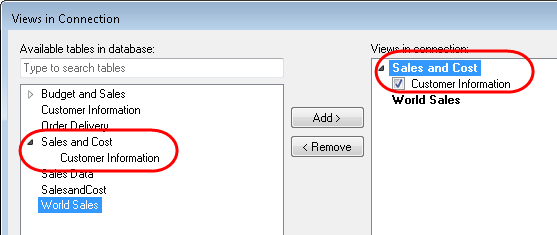

A data connection is used when you are analyzing massive amounts of data and you need to keep the underlying data in the database (in-db) rather than bringing it into Spotfire's internal data engine. However, you can also select to import data tables from relational data connections. Both imported and in-db data tables from a relational connection can be set up to be loaded on demand only. On-demand is not available for cube connections.
The data connection consists of two parts:
One or more data tables which may or may not be used by the analysis.
Both the connection data source and the data connection itself can be shared in the library, if desired.
Spotfire Analysis |
Data Connection |
Connection Data Source |
|
Shared in library |
Shared in library |
|
Shared in library |
Embedded in connection |
|
Embedded in analysis |
Shared in library |
|
Embedded in analysis |
Embedded in connection |
When your analyses use shared data connections you can easily update the data in a large number of analyses simultaneously by updating the data connection.
The data connections may either contain an embedded connection data source or a shared connection data source. When it comes to editing, a shared data source may temporarily be embedded in the connection, if necessary.
If your analysis contains a shared data connection you may still be able to use a cached version of the data connection if you are offline. However, this may result in inconsistencies with the expected data from the data connection on the library if the cached data is out of date.
Views in the Connection
A data connection from a cube data source always consists of a single view or data table, which combines all of the information from the selected cube.
Data connections based on relational databases may contain one or more views, which may be used as data tables in the analysis. Each of the views may also be built by more than one of the source tables from the database, joined into a single view using structural relations. These relations may have been set up by the database administrator in the database but they may also be manually created in the Views in Connection dialog.

The selection of which data tables should be available in the analysis is also done in the Views in Connection dialog. In the image above the data connection will create two views and one of those is a view combined by two related source tables. Data connections shared in the library contain a specified set of views, but data connections that are embedded in the current analysis can be edited within the context of the analysis and the currently used views in the connection can be updated. You can always embed a data connection in the Data Connection Settings dialog if you need to make any changes to the data tables in this particular analysis.
If you want to add data tables based on a view that is included in a connection already added to an analysis, you should use the Add Data Tables > From Analysis option rather than adding a second connection based on the same source. Since the addition of a connection to an analysis adds all views available in that connection, you already have access to all of those views in the analysis and you only need to create a new data table from it. Adding a second connection based on the same data would create another set of views and, hence, increase the impact of the analysis on the external system.
See also:
Adding Data Connections to an Analysis